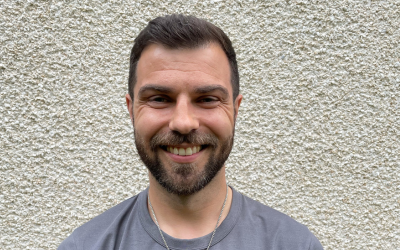Richard Foster
 Footballer-turned-coach uses psychology degree to gain insight in the dressing room
Footballer-turned-coach uses psychology degree to gain insight in the dressing room
After leaving school at aged 16 to pursue a football career, Scottish professional sportsperson Richard Foster – who has played for clubs including Rangers - took the bold decision to return to education in his late 20s and undertake a Bachelor of Science (Honours) degree in Psychology.
He decided that The Open University (OU) was the “exact platform I needed” to return to learning.
“I couldn’t commit to going into a university because I had a full-time job, but the OU allows you to manage your own time and fit in studying whenever you can,” he explains.
To help balance studying with his work and personal life, Richard explains: “I would spread my week’s work out across weekday afternoons, but I set a time limit each day.
“I wouldn’t work past 7pm. Initially that was just the time I’d have dinner, but I realised that this allowed me to calm down before bed and stopped me becoming overwhelmed in any given day.”
When it comes to researching and writing essays, he recommends “never go to the point of exhaustion because it’s harder to start again after that”.
‘My tutors stopped me from giving up’
Richard – who is married to Scottish singer Amy Macdonald – juggled his exams and end-of-module assignments around work and life commitments.
He points out: “On one occasion I had an exam, that I had already postponed due to getting married, which I had to sit in the afternoon before playing Celtic in a cup game that evening.”
Throughout the six years of his degree, Richard says he had “excellent support” from OU tutors.
“My questions and queries were usually resolved and answered promptly, and on a couple of occasions when I felt snowed under my tutors stopped me from giving up. I wouldn’t have made it through the degree without their help and support,” he says.
‘Studies given me a great insight into the working of relationships’
Richard recommends picking a subject “that interests you and that you will fully engage in and go for it”.
He chose to study psychology because he was “very interested in the psychological relationship between players in the dressing room and the relationships with coaches and managers”.
Richard is now lead development coach at Scottish Premiership side Motherwell. As a player he represented clubs including Rangers, Aberdeen, and Partick Thistle.
I had a real sense of pride when I handed in my last essay and even more when I got my [degree] certificate through the door."
“My studies have given me a great insight into the working of relationships, both personal and professional,” he explained as a player, saying, “They helped me massively with my own issues and without them I don’t think I’d still be playing football.”
Richard admitted that he could sometimes experience a short temper on the pitch, but he found that his studies helped him better manage his emotions and “employing techniques I’d read about such as self-talk and meditation really helped overcome these issues”.
“I am also better, not great, but better at letting things go,” Richard said, during his playing days.
“Defeats and poor performances would fester in my head for days and days previously, but now I can get over them more quickly. I still hate losing, but I realise it’s a big part of the game.”
On completing his degree, achieving a 2:1 award, Richard says: “To be finished feels amazing. I had a real sense of pride when I handed in my last essay and even more when I got my certificate through the door.
“Leaving school at 16, I waited 12 years before doing anything remotely close to studying and it was tough.”
'Skills learned during degree very beneficial when coaching'
Richard’s football career has continued as assistant manager at Detroit City in the USA, and now with his Motherwell Football Club coaching role.
Doing my degree, being able to take a step back from football, allowed me to gain a better insight into the human side of football."
He says: “My degree has given me more awareness of the fluctuating emotions of young players and has also taught me a great deal about empathy.
“A lot of what they have to deal with I have experienced but the explosion of social media has created an entire new dimension for these players to navigate.
“This brings with it different challenges than I faced but the skills I learned during my degree have proven to be very beneficial when coaching and dealing with this new dynamic.
“The environment I try to create for my players is one of trust, compassion and honesty.
“Doing my degree, being able to take a step back from football, allowed me to gain a better insight into the human side of football.”